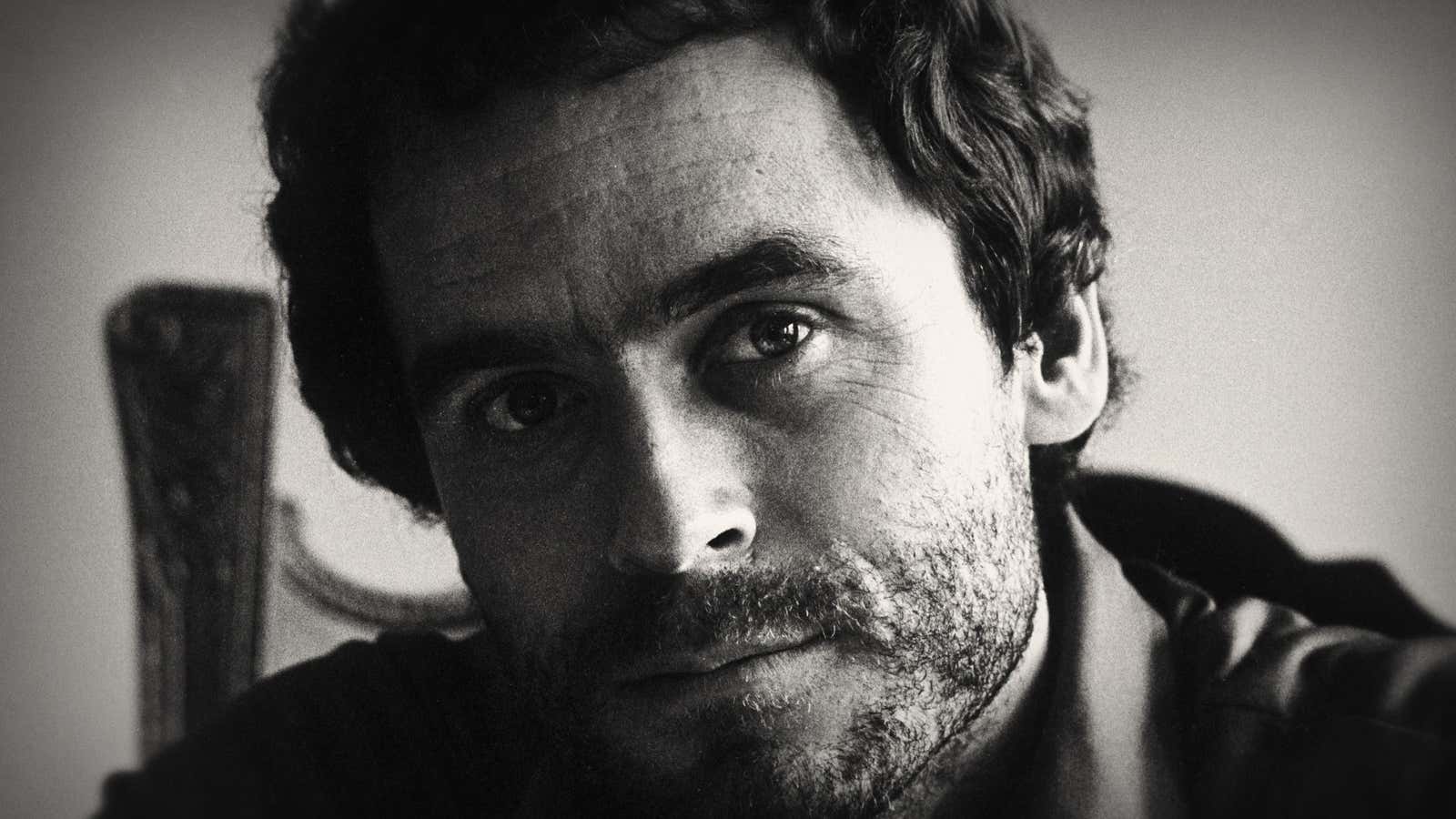Netflix says it wants people to stop lusting after Ted Bundy, because that’s what it has to say. But make no mistake, the streaming service is loving all the memes and tweets about the infamous serial killer’s “hotness.”
Bundy, who raped and murdered dozens of young women in the 1970s, was caught in 1978, and executed in 1989, remains one of the world’s most studied serial killers. That’s in part because he looked and often acted (according to some that knew him) like a normal, well-adjusted person. Since his execution, Bundy has been analyzed in countless films, documentaries, books, and songs, as Americans still struggle to understand how a human being could be capable of such atrocities—especially one as classically handsome as Bundy.
So it was only a matter of time before Netflix, in its quest to be the only entertainment platform you’ll ever need, produced a documentary about Bundy. Last week, the streamer released Conversations with a Killer: The Ted Bundy Tapes, a four-part docu-series featuring never-before-heard audio of the killer discussing his crimes in the third person. (For years after his capture, Bundy maintained he was innocent, only confessing to the murders shortly before he was executed.) Joe Berlinger, the writer and director of the documentary, also directed the Bundy film Extremely Wicked, Shockingly Evil and Vile, which stars heartthrob Zac Efron as the vicious killer and premiered at the Sundance Film Festival this month.
Much of the Netflix documentary focuses on how Bundy’s physical appearance—some might say, his attractiveness—fooled so many people into believing he was just a normal friend, boyfriend, neighbor, or colleague. Not long after the documentary was released (and perhaps exacerbated by Efron’s casting as Bundy), memes about Bundy’s “hotness” spread on social media—so many that Netflix came out and tweeted to instruct viewers to maybe not joke about the heinous killer and necrophile:
A number of outlets picked up on the tweet, reporting that Netflix wants everyone to stop calling Bundy “hot” and lusting after the serial killer. Except, doesn’t the streaming service feed off these memes? Doesn’t it want Bundy, and its documentary specifically, to be a trending internet topic? Doesn’t it, deep down, need people to keep making dumb and insensitive Bundy memes? Netflix might not admit it, but helping generate a storm of memes is its whole public relations strategy.
Because Netflix TV shows aren’t released weekly and Netflix films usually don’t come out in movie theaters, the streaming service has had to figure out another way to keep buzz about afloat for more than a day or two. The streamer’s answer has been to make its shows ubiquitous on the internet, to make conversations about them unavoidable: Its accounts retweet fan-made memes, craft memes of their own, tweet from corporate accounts in the third person, and more. Netflix is quietly pulling the strings on much of what you see on social media in response to its latest hit shows.
Take Bird Box. There were so many memes for the apocalyptic thriller that Netflix was actually accused of making fan accounts to mimic grassroots interest in the film. (There wasn’t much evidence for these charges, but it probably wouldn’t shock anyone had Netflix really done that, given how often the company has been able to exploit the social media zeitgeist surrounding its viral film). When the “#BirdBoxChallenge” led people to walk into the street or drive cars blindfolded, Netflix tweeted pleading with people not to hurt themselves doing the viral challenge. It didn’t say anything about not doing the challenge at all. The challenge, in general, is amazing PR for Netflix. In fact, the mere act of commenting on the challenge likely boosted its popularity, continuing a cycle that benefited the streaming service.
Its recent Fyre Festival documentary is another example. Andy King, one of the doomed festival’s producers, commented in the documentary that he was prepared to perform fellatio in return for acquiring water for the festival. Naturally, that spawned dozens of memes. The streaming service tweeted an interview in which he responds to those memes. It’s not hard to imagine this drew more viewers to Netflix’s documentary, which came out a few days after a competing documentary from Hulu.
Netflix marketing executives know that these kinds of memes, whether they’re mostly innocuous or unfortunately glorifying a man convicted of unspeakable crimes, are good for business. They increase interest, drive up viewers, and, ultimately, boost subscriptions. Netflix might claim it doesn’t want you to think Ted Bundy was hot, but every time someone does, it’s another dollar in the streaming service’s pocket.
